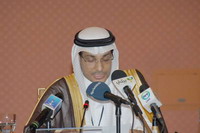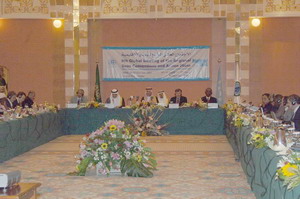
9th Regional Seas Meeting - 29-31 Oct, 2007 - Jeddah
With kind hosting by the Kingdom of Saudi Arabia, the 9th Global Meeting of Regional Seas Conventions and Action Plans (RSCAPs) was held during 29-31 October 2007 at the Conference Palace in Jeddah. The meeting was organized by UNEP in collaboration with PERSGA,
HRH Prince Turki bin Naser Bin Abdelaziz (President of the Presidency of Meteorology and  Environment-PME, Kingdom of Saudi Arabia opened the meeting activities. In his welcome address, HRH indicated the efforts by the Kingdom of Saudi Arabia headed for conservation of the marine environment through adoption of the ecosystem approach; within the framework of the Kingdom policies and directives to achieve sustainable development in all sectors. HRH further explained the role played by the Kingdom along with the international community in the conservation and the protection of the marine environment in favor of the wellbeing of mankind. He also emphasized on the role of the Saudi government in supporting PERSGA, which has enabled the later to attain achievements at the regional level. Expressing his thanks to the participants for their coming, HRH concluded his welcome address wishing all a successful meeting and a pleasant stay in Jeddah.
Environment-PME, Kingdom of Saudi Arabia opened the meeting activities. In his welcome address, HRH indicated the efforts by the Kingdom of Saudi Arabia headed for conservation of the marine environment through adoption of the ecosystem approach; within the framework of the Kingdom policies and directives to achieve sustainable development in all sectors. HRH further explained the role played by the Kingdom along with the international community in the conservation and the protection of the marine environment in favor of the wellbeing of mankind. He also emphasized on the role of the Saudi government in supporting PERSGA, which has enabled the later to attain achievements at the regional level. Expressing his thanks to the participants for their coming, HRH concluded his welcome address wishing all a successful meeting and a pleasant stay in Jeddah.
PERSGA's Secretary General Prof. Ziad Hamzah Abu-Ghararah addressed the meeting and expressed his gratitude and appreciation to the government of Kingdom of Saudi Arabia for its generous hosting of this important international meeting. He pointed out the importance of the marine environment in sustaining life on earth, the integration of its ecosystem with that of the terrestrial ecosystem, and the growing impacts pressures as a result of the increased human activities and the economic development on both systems in recent years.
expressed his gratitude and appreciation to the government of Kingdom of Saudi Arabia for its generous hosting of this important international meeting. He pointed out the importance of the marine environment in sustaining life on earth, the integration of its ecosystem with that of the terrestrial ecosystem, and the growing impacts pressures as a result of the increased human activities and the economic development on both systems in recent years.
The PERSGA SG also emphasized on the ecological and economic importance of the Red Sea and the Gulf of Aden from both regional and global perspectives, which refers to the uniqueness of the Red Sea, its enormous biodiversity, semi-isolation and prime significance for international navigation, as well as supporting substantial touristic and economic investments on its coasts. He stressed on the importance of conserving the Red Sea, as it is one of the least polluted regional seas in the world, and concluded his address by signifying some PERSGA efforts in this regard.
United Nations Environment Programme (UNEP) Mr. Shafqat Kakahl,the Deputy Executive Director of UNEP started his address to the meeting by expressing his sincere appreciation to the Kingdom of Saudi Arabia, for its generous hosting of the conference, and to PERSGA for its support and excellent organisation of the meeting. He pointed to the cooperation between UNEP and PERSGA, which can be traced back to the time of initiating the implementation of the Jeddah Convention in1989. Finally, he put emphasis on the importance of addressing the accelerated degradation of the worlds oceans and coastal areas, and highlighted the measures taken by UNEP to address this problem, particularly through fostering cooperation between countries sharing regional seas. After the welcome and opening addresses, the meeting selected
Kingdom of Saudi Arabia, for its generous hosting of the conference, and to PERSGA for its support and excellent organisation of the meeting. He pointed to the cooperation between UNEP and PERSGA, which can be traced back to the time of initiating the implementation of the Jeddah Convention in1989. Finally, he put emphasis on the importance of addressing the accelerated degradation of the worlds oceans and coastal areas, and highlighted the measures taken by UNEP to address this problem, particularly through fostering cooperation between countries sharing regional seas. After the welcome and opening addresses, the meeting selected
Dr. Abdelrahman Fadl Al-Eryani (Minster of Water and Environment in the Republic of Yemen) to chair the meeting sessions. The approximately Seventy participants of the meeting represented executive directors, coordinators and secretary generals of the conventions, regional organizations and senior staff from the UNEP, IPCC, other related international organizations, in addition to the PERSGA Focal Points.
The meeting held around ten sessions distributed over three days, besides the opening and closing ones, and other five meetings of the ad hoc groups responsible for drafting the Jeddah Declaration and the RSCAPs Strategic Directions (2008-2012). The event was extensively covered by media, including 11 radio/ TV broadcasting channels; ten local, four regional and three international newspapers. Many issues and case studies were presented and discussed in the meeting according to the agenda prepared by UNEP and deliberated by PERSGA specialists, who had also significantly contributed to drafting the Jeddah Declarations and Strategic Directions 2008-2012s.
The following is a summary of the major topics that were discussed:
-
Achievements attained and major challenges met during the implementation of the Regional Seas Strategic Directionss 2004-2007
-
Adapting to and mitigating the impacts of climate change on the marine and coastal environment.
-
Millennium Ecosystem Assessment.
-
Ecosystem-based Approach.
-
International governance and scientific issues relating to the high seas and deep-sea ecosystems and biodiversity.
-
Technical cooperation and capacity-building.
-
Jeddah Declaration and Regional Seas Strategic Directions 2008-2012.
-
Upcoming events and emerging issues.
The major outcome of the meeting was the adoption of the Jeddah Declaration and Strategic Directions 2008-2012, after both documents had been approved by all participants.
In the closing session the participants expressed their thanks to the government of Saudi Arabia for hosting this important meeting and showed appreciations to PERSGA for the good organization of the meeting. PERSGA achieved a major success by organizing this international meeting, which was considered a landmark in consolidating and strengthening its international partnerships with other organizations. Also this meeting has paved the way to strengthen the pillars of the good relations between PERSGA and UNEP, which will eventually benefit the countries in the region.
Regional Seas Programme:
UNEP Regional Seas Programme is one of the major achievements of UNEP during the last 30 years. The programme aims at addressing the accelerated degradation of the environment of the worlds oceans and coastal areas through the sustainable management and use of the marine and coastal environment.
The programme intention is to engage the neighboring countries in comprehensive  and specific action plans to protect their shared marine environment. Today, there are 19 Regional Seas Conventions and Action Plans (RSCAPs), representing more than 140 countries around the world. The program which was established under the auspices of UNEP consists of the following RSCAPs: the Black Sea, Wider Caribbean, East Africa, South East Asia, ROPME (Gulf Area), Mediterranean, North-East Pacific, North-West Pacific, Red Sea and Gulf of Aden, South Asia, South-East Pacific, Pacific, and Central West Africa. Furthermore, there are five partner programmes for the Antarctic, Arctic, Baltic Sea, Caspian Sea and North-East Atlantic Regions. Their program of work is being coordinated by the UNEP Regional Seas Secretariat at UNEP Head quarters in Nairobi.
and specific action plans to protect their shared marine environment. Today, there are 19 Regional Seas Conventions and Action Plans (RSCAPs), representing more than 140 countries around the world. The program which was established under the auspices of UNEP consists of the following RSCAPs: the Black Sea, Wider Caribbean, East Africa, South East Asia, ROPME (Gulf Area), Mediterranean, North-East Pacific, North-West Pacific, Red Sea and Gulf of Aden, South Asia, South-East Pacific, Pacific, and Central West Africa. Furthermore, there are five partner programmes for the Antarctic, Arctic, Baltic Sea, Caspian Sea and North-East Atlantic Regions. Their program of work is being coordinated by the UNEP Regional Seas Secretariat at UNEP Head quarters in Nairobi.
UNEP is holding an annual global meeting for RSCAPs in order to exchange experiences and develop future strategies and plans.
Jeddah Declaration:
We the Chairs of the Conferences of the Parties/Intergovernmental Meetings of the Regional Seas Conventions and Action Plans (RSCAPs); the Secretaries General/Coordinators/Executive Secretaries of the RSCAPs; with the valued support and concurrence of delegates from international organizations, conventions, intergovernmental panels, financial institutions and academia,
Having met in Jeddah from 29 to 31 October 2007 at the 9th Global Meeting of the Regional Seas Conventions and Action Plans,
Recalling the Declaration of the United Nations Conference on the Human Environment, adopted in Stockholm on 16 June 1972, the Rio Declaration of 14 June 1992, the UN Millennium Declaration 2000, the Plan of Implementation of the World Summit on Sustainable Development 2002 and the Beijing Declaration 2006,
Acknowledging the ultimate dependence of life including mankind and other life forms on the health and integrity of the marine and coastal environment,
Recognizing the value of marine and coastal resources as the main source and reserve for food security, economic well-being and health for a significant number of people in the world,
Also, recognizing that marine and coastal environments are vulnerable to unprecedented impacts of climate change, along with the impacts of the continuing and projected increase in marine and coastal pollution; reflecting the findings and detections of the IPCC assessment reports and the projected detrimental social, economic, health and environmental impacts in the coastal areas, where 38% of the world population live and 70% of the world mega-cities exist,
Noting the growing damage that those impacts are causing to the people and marine ecosystem including loss of habitats (such as corals, wetlands), biodiversity, and income generating and food resources,
Emphasizing the key role of the RSCAPs in facilitating the implementation of current and future global conventions, strategies, declarations, resolutions, initiatives, and action programmes addressing coastal and marine environment protection and conservation,
Admitting that effective integration policies and programmes addressing 
Acknowledging the trans-boundary nature of the marine and coastal environment and the growing need for regional and global collaboration and coordination in addressing environmental issues, and progress made in the implementation of the Strategic Directions for the Regional Seas Programmes 2004-2007,
Realizing the global challenges in adapting to and mitigating the impacts of climate change on the marine and coastal environment, and noting the importance of the RSCAPs as useful forums for highlighting climate change,
Also realizing the potential for legal and economic measure to enable carbon capture and storage in sub-sea geological formations within a suite of climate change mitigation measures,
Considering the importance of the use of economic valuation of goods and services provided by coastal and marine resources, in addition to applying cost-benefit analysis to support preventive approaches in addressing environmental management priorities, Also,
Considering that the conservation of the high seas and deep-water ecosystems and biodiversity needs global cooperation regarding both relevant international governance and scientific issues,
Conscious of the need to support the mainstreaming of the Regional Seas conventions, protocols and action plans into national development planning and budgeting,
Aware of the need to further implement the ecosystems approach in management, and continue to develop proactive, creative and innovative partnerships and networks to support its implementation,
Convinced of our responsibilities to encourage and support our member states to fulfill their commitments to protect and conserve the marine environment through implementing regional agreements and instruments, along with the strategic directions and recommendations of the global Regional Seas , and seeking to build upon them, Resolve:
1. To recommit ourselves to implement the existing resolutions and agreements of the
2. To support the implementation of the Beijing Declaration of the Global Programme of Action for the Protection of the Marine Environment from Land-based Activities, especially the provision related to the "development and implementation of protocols addressing land-based pollution sources and activities";
3. To commit ourselves to furthering the implementation of the RSCAPs in light of the Global Strategic Directions for the Regional Seas Programmes 2008-2012 (adopted at the 9th Global Meeting of the Regional Seas Conventions and Action Plans), and declare our intention to do so by designing, implementing and strengthening our actions;
4. To call upon United Nations agencies and UN inter-agency groups, multilateral environmental agreements, and regional alliances/unions/leagues or any kind of association to support (through inter alia, financial assistance, technical assistance, capacity building and institutional strengthening mechanisms) the regional structures for implementing the Global Strategic Directions for the Regional Seas Programmes 2008-2012;
5. To encourage State Parties of RSCAPs, as appropriate and according to their own procedures, to consider, adopt and implement the Global Strategic Directions for the Regional Seas Programmes 2008-2012;
6. To develop and implement actions to adapt to the impacts of climate change, including strengthening regional monitoring to detect changes in oceanographic parameters, carrying out vulnerability assessments, developing regional and national early warning systems, cooperation in contingency planning and disaster management, assessment and mitigating socio-economic impacts and taking relevant precautionary measures with regard to coastal planning and development;
7. To call upon international and regional financial institutions and donor countries to support the implementation of the Global Strategic Directions for the Regional Seas 2008-2012, at the appropriate levels in developing countries;
8. To promote and enhance the participation and involvement of 
9. To initiate and strengthen partnerships at the national, regional, and international levels, with emphasis on promoting sustainable financing mechanisms to implement the Global Strategic Directions for the Regional Seas 2008-2012;
10. To enhance the application of ecosystems approach to coasts, oceans and large marine ecosystems and island management and to strengthen them at the national level;
11. To integrate and mainstream economic valuation of goods and services provided by coastal and marine resources, to support sustainable approaches in addressing environmental management priorities;
12. To continue encouraging, supporting, enhancing and developing appropriate tools and mechanisms to mainstream RSCAPs into national planning and budgeting;
13. To call upon the UNEP Governing Council/Ministerial Environment Forum to endorse and enhance the implementation of the Global Strategic Directions for the Regional Seas 2008-2012.
14. To express special gratitude and appreciation to the Government of the Kingdom of Saudi Arabia for hosting the 9th Global Meeting of the Regional Seas Conventions and Action Plans held in Jeddah 29-31 October 2007.
